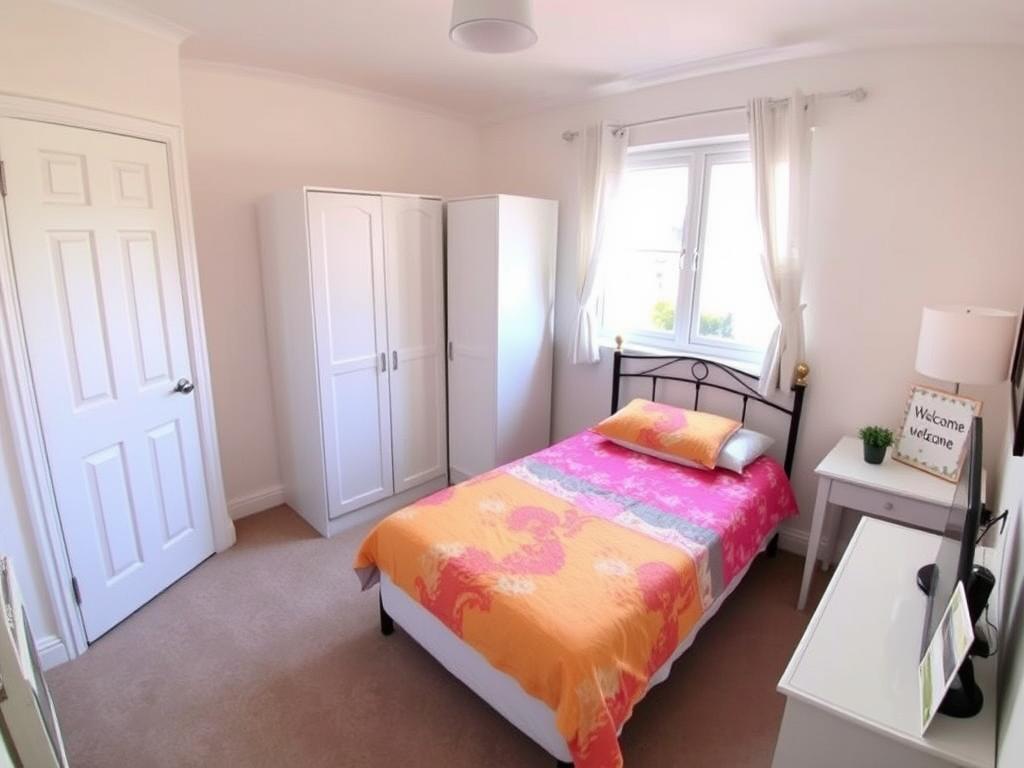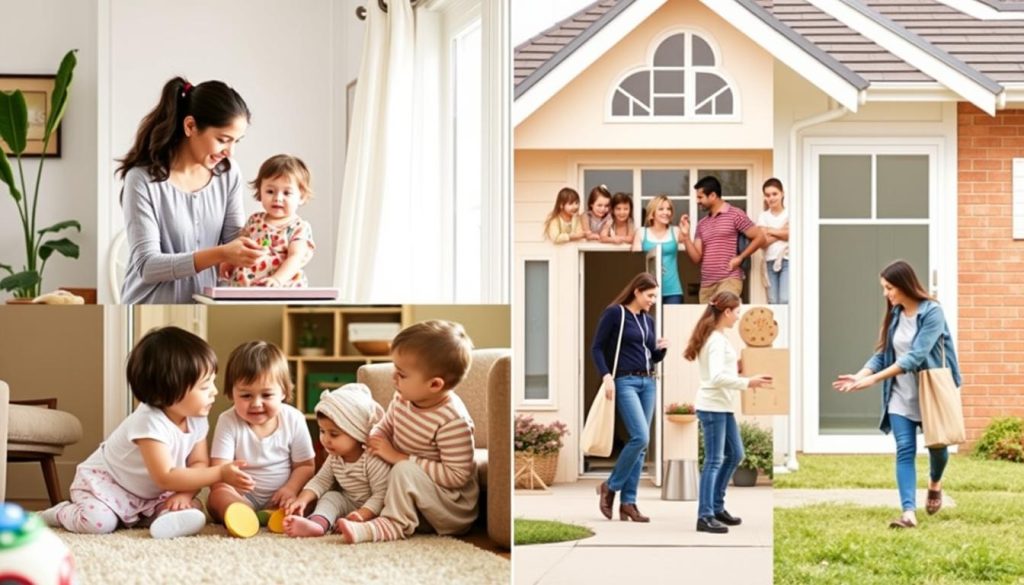If you’re considering hiring an au pair for childcare, one of the first questions you might have is whether au pairs must live with your family. The short answer is yes, au pairs are required to live with their host families as part of the official au pair program requirements. This live-in arrangement is fundamental to the cultural exchange aspect that defines au pair programs worldwide.
In this comprehensive guide, we’ll explore everything you need to know about the au pair living arrangement, from legal requirements to practical considerations for making the experience successful for everyone involved.
Legal and Program Requirements for Au Pair Housing
The au pair program is regulated by specific requirements regarding living arrangements. These requirements ensure that au pairs have appropriate accommodations during their stay with host families.
Basic Housing Requirements for Au Pairs
According to official au pair program guidelines, host families must provide:
- A private bedroom for the au pair within the family home
- A room with adequate space (minimum 9 square meters/97 square feet)
- A room with a window and proper heating
- A door that can be closed, preferably with a lock for privacy
- Basic furnishings including a bed, storage space for clothes, and a desk or study area

While a private bathroom is not mandatory, many host families choose to provide one if possible. If the au pair shares a bathroom, program guidelines typically recommend that they share with the children rather than the parents.
In addition to accommodation, host families are required to provide:
- All meals for the au pair when they are at home
- Weekly stipend (pocket money) as specified by program regulations
- Access to transportation for their duties and personal time
Why Au Pairs Must Live With Host Families
The live-in requirement isn’t arbitrary—it serves several important purposes that benefit both the au pair and the host family.
Cultural Exchange Purpose
The primary goal of au pair programs is cultural exchange. By living with a family, au pairs gain authentic exposure to American family life, customs, and traditions. This immersive experience helps them improve their language skills and develop a deeper understanding of the culture.
For host families, having an au pair live in their home provides daily opportunities for cultural learning and exchange. Children grow up experiencing another culture firsthand, often learning basic phrases in the au pair’s native language.

Program Regulation and Safety
The live-in requirement also helps ensure the safety and well-being of au pairs. As young adults in a foreign country, living with a host family provides a support system and stable living environment. Program agencies can better monitor the au pair’s experience and ensure program guidelines are being followed when they’re part of the household.

Practical Benefits for Childcare
From a practical standpoint, having an au pair live in your home offers significant advantages for childcare:
- Flexibility for early mornings, evenings, or occasional overnight care
- No transportation delays or cancellations due to weather
- Simplified scheduling for families with unpredictable work hours
- Consistency for children who develop a close bond with their au pair
Typical Living Arrangements for Au Pairs
While the basic requirement is a private bedroom, au pair living arrangements can vary widely depending on the host family’s home.
Common Au Pair Room Locations
- A bedroom on the same floor as the family bedrooms
- A bedroom in a finished basement with proper windows and heating
- A converted office or guest room on the main living floor
- An attic room that meets safety and comfort requirements
Privacy Considerations
While au pairs must live with the family, respecting their privacy is essential for a successful relationship. Many families find these approaches helpful:
- Establishing clear house rules about private spaces and common areas
- Providing the au pair with a key to their bedroom
- Creating a schedule for shared bathroom use if necessary
- Discussing expectations about quiet hours and personal time

Are There Exceptions to the Live-in Requirement?
While the standard requirement is for au pairs to live with their host families, there are rare exceptions and special circumstances that might be considered.
Exceptional Circumstances
In very limited cases, some au pair programs may permit alternative living arrangements if:
- The family’s home is too small but they can provide suitable nearby accommodation
- The family owns a separate guest house or apartment on their property
- During temporary situations like home renovations
However, these exceptions are rare and must be approved by the sponsoring agency. The key requirement is that the au pair must still be fully integrated into family life and the cultural exchange aspect must be maintained.

Important Note: If you’re considering an alternative living arrangement, you must discuss this with your au pair agency before matching with an au pair. Not all agencies permit exceptions, and this must be clearly communicated to potential au pairs during the matching process.
Comparing Au Pairs to Other Childcare Options
Understanding how au pairs differ from other childcare options can help you determine if the live-in arrangement is right for your family.
| Childcare Type | Living Arrangement | Hours Flexibility | Cultural Component | Cost Considerations |
| Au Pair | Lives with family | Up to 45 hours/week, flexible scheduling | Strong cultural exchange | Fixed program fee plus weekly stipend |
| Live-in Nanny | Lives with family | Negotiable, often more hours | No formal cultural component | Higher salary, employment taxes |
| Live-out Nanny | Lives separately | Set schedule, less flexibility | No formal cultural component | Hourly rate, employment taxes |
| Daycare | Facility-based | Fixed hours, closed holidays | Minimal | Per child, often less for multiple children |

Benefits and Challenges of the Live-in Arrangement
The live-in requirement of the au pair program comes with both advantages and potential challenges for host families and au pairs.
Benefits of Having an Au Pair Live With You
- Flexibility for early mornings, evenings, and occasional weekends
- Reduced commuting stress and transportation issues
- Cultural enrichment for the entire family
- Consistent care from someone who becomes like family
- Cost-effective for families with multiple children
- Built-in language learning opportunities
- Reliable backup during school closures or sick days
Challenges to Consider
- Reduced privacy for both the family and the au pair
- Potential personality conflicts in close quarters
- Cultural differences in living habits and expectations
- Need for clear boundaries between work and personal time
- Space requirements in your home
- Adjustment period for everyone involved
- Responsibility for another person’s well-being
Real-Life Example: The Johnson Family
The Johnsons, a family with three children ages 2, 5, and 8, welcomed their first au pair from Germany last year. “Having Maria live with us was an adjustment at first,” says Karen Johnson. “We had to be more conscious about our family dynamics with someone new in our home. But after a few weeks, it felt completely natural. Now we can’t imagine our family without the cultural dimension she’s added, and the children have learned so much from her.”
Making the Live-in Arrangement Successful
Creating a positive living environment for both your family and your au pair requires thoughtful preparation and clear communication.
Before Your Au Pair Arrives
- Prepare a welcoming, comfortable room
- Create a welcome packet with house information
- Discuss the living arrangement with your children
- Plan a home tour and orientation
- Stock the room with basic necessities

Establishing Clear Expectations
Setting clear expectations from the beginning helps prevent misunderstandings and creates a harmonious living environment:
- Create a written household handbook with rules and preferences
- Discuss meal arrangements and food preferences
- Establish guidelines for common area use and quiet hours
- Clarify expectations about guests and overnight visitors
- Set boundaries for personal space and privacy
- Discuss internet use, utilities, and shared resources
Ongoing Communication
Regular check-ins help maintain a positive relationship:
- Schedule weekly meetings to discuss any concerns
- Be open to cultural differences and learning opportunities
- Address small issues before they become larger problems
- Respect your au pair’s time off and personal space
- Include your au pair in family activities when appropriate
Conclusion: Is the Live-in Arrangement Right for Your Family?
Yes, au pairs are required to live with their host families, it’s a fundamental aspect of the program that supports its cultural exchange mission. This arrangement offers unique benefits like flexibility, cultural enrichment, and consistent care from someone who becomes part of your family.
However, the live-in requirement also means sharing your home and family life, which requires adjustment and compromise from everyone involved. For families with adequate space who value cultural exchange and flexible childcare, the au pair program can be an excellent choice.
By understanding the requirements, preparing appropriately, and maintaining open communication, you can create a positive living environment that benefits both your family and your au pair, leading to a rewarding cultural exchange experience for everyone.


